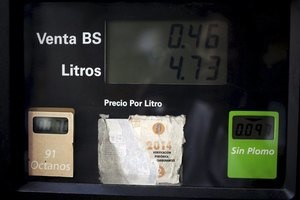By John O'Donnell and Francesco Canepa
FRANKFURT (Reuters) - Is the spectre of deflation finally being lifted from Europe's economy, still struggling to get on its feet after the economic crisis?
Consumer prices in the 19-member euro zone halted their slide in March, the EU's statistics agency said on Thursday.
Add to that an emerging consensus that oil prices may have bottomed out and could even rise further -- a prospect that would in turn help the European Central Bank in its efforts to push inflation up to more normal levels and kickstart recovery with negative interest rates and mass stimulus.
Even if oil prices simply hold steady at $44 a barrel, 60 percent above a 12-year low near $27 level reached in January, that would gradually offset the dampening effect of energy on inflation and by year-end gently lift the year-on-year figure.
Some euro zone central bankers hope the scale of recent ECB action and the promise of gradual economic improvement will relieve the ECB of any need to move again for at least several months, people familiar with the matter have said.
"The pendulum is swinging away from any need for further action," said one source familiar with central bank thinking, noting any extra steps would only have a muted impact, after a 1.7-trillion-euro-plus money printing scheme and rock-bottom borrowing costs.
LIMP RECOVERY
Oil producers are to discuss a plan to freeze output on Sunday in Doha. Despite doubts whether it is enough to tackle a supply glut, many oil trading executives think prices have probably bottomed out and will rise. [nL5N17F3WW]
Some of the ECB's governors remain worried nonetheless about stubbornly low prices because they fear that should the cost of, say, cars or fridges fall, it will depress spending as consumers hold off in the hope of bigger discounts.
The euro zone slipped into deflation -- defined as when prices fall for a protracted period -- at the end of 2014 before making a limp recovery. Thursday's tiny upward revision of March figures puts inflation at zero, up from an earlier estimate of a 0.1 percent decline. It nonetheless remains far off the ECB's target of close to 2 percent, a level last seen in early 2013.
Deflation is one of the biggest worries of central banks because, should it take hold, the economy gets locked in a spiral of falling wages and spending that is hard to reverse.
The phenomenon risks taking hold in Spain, where prices have been falling since the middle of 2014, as well as Greece, where the slump has been most pronounced.
The price of energy makes up roughly one tenth of the inflation calculation. When calculating future inflation, the ECB has factored in a price of just under $35 per barrel this year and roughly $41 in 2017.
If oil prices hold steady and rise, that will filter through to prices in the real economy and even start to push up headline annual inflation once the price rises above its year-ago level.
"When we get the base effect from oil prices in the second half of the year the whole debate around the ECB may change," said Anatoli Annenkov, an economist at Societe Generale (PA:SOGN).
"It will become easier for the ECB... to argue its actions are having some effect."
Some economists, however, believe that regardless of the outcome, the ECB is bound to do more.
"Inflation in the second half of the year will probably be higher than what the ECB expects. Does that remove some incentive (to ease policy) in the short term? Maybe to some extent," said Raphael Brun-Aguerre, an economist at JPMorgan (NYSE:JPM).

"But this inflation trajectory doesn't change much what's going to happen in 2017 and 2018. If they have the belief that they're going to miss on the inflation target in two years’ time, that creates a problem." [nL3N17G45Q]